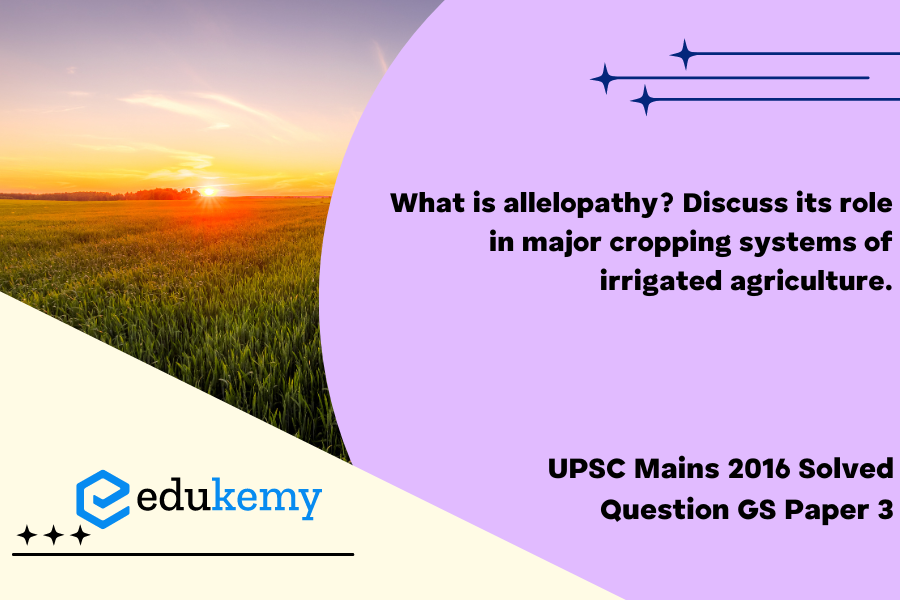Allelopathy is a fascinating ecological phenomenon wherein plants release biochemical compounds into their environment, influencing the growth and development of neighboring plants. These allelochemicals can have both stimulatory and inhibitory effects on the germination, growth, and overall performance of other plant species. In the context of irrigated agriculture, allelopathy plays a crucial role in shaping the dynamics of major cropping systems. The release of allelochemicals from one crop can impact the growth of nearby crops, either enhancing or hindering their productivity. Understanding allelopathic interactions is essential for optimizing crop management practices, as it can be harnessed to promote crop allelopathy for weed suppression or pest control. Conversely, awareness of potential negative allelopathic effects is crucial for devising suitable crop rotations and intercropping strategies to mitigate such impacts and ensure sustainable agricultural practices in irrigated systems. Overall, allelopathy adds a nuanced layer to the intricate web of interactions within cropping systems, influencing agricultural productivity and sustainability.
Tag: Major crops, cropping patterns in various parts of the country.
Contents
Decoding the Question:
- In the Intro, try to define the concept of Allelopathy
- In Body, discuss allelopathy’s role in major cropping system of irrigated agriculture.
- Try to conclude the answer with need of application of allelopathy and its advantages in brief.
Answer:
Allelopathy refers to a biochemical phenomena where one organism influences the germination, growth, survival and reproduction of another organism using biochemicals. The impact can be beneficial (positive allelopathy) or detrimental (negative allelopathy). It is a branch of chemical ecology. Chemical interference is used as a tool of competition

The role of allelopathy in major cropping system of irrigated agriculture:
- In sustainable weed management: Allelopathy applications such as straw mulching provide sustainable weed management. It also helps in reducing the negative impact of the environment on agriculture. Straw mulch improves the organic matter in the soil and increases its fertility. Allelochemicals are also called natural herbicides as they provide a natural defense mechanism against pathogens and bacteria.
- Plant- animal/ insect interactions: Allelo chemicals may variously act as feeding attractants or repellents, have hormonal effects on the insects or provide the insects with a useful defense mechanism against predation. Many border plants are used in this manner around fields and gardens to keep undesired animals away.
- Reduction of nitrogen leaching and environment pollution: Nitrogen leaching is a severe ecological problem due to water pollution. In recent years studies have proven that nitrification inhibiting substances (NIS) produced by plants can reduce the emission of N2O, improve the utilization rate of nitrogen fertilizers and reduce pollution to the environment.
- Allelochemicals can stimulate or inhibit plant germination and growth and permit the development of crops with low phytotoxic residue amounts in water and soil, thus facilitating wastewater treatment and recycling.
- Intercropping systems of soyabean, sesame and sorghum in cotton fields provide better net yield and significant inhibition over purple nutsedge in comparison with cotton only fields.
- The allelochemical structure can be used as an analogue for the synthesis of new pesticides. These bio-pesticides are extremely less harmful when compared with synthetic pesticides.
Allelopathy is a novel application to improve crop yield to meet the demands of an ever-increasing population. However, inadequate research data has resulted in ineffective implementation. It can provide agricultural sustainability, environmental protection, food security, resource conservation and economic viability.
In case you still have your doubts, contact us on 9811333901.
For UPSC Prelims Resources, Click here
For Daily Updates and Study Material:
Join our Telegram Channel – Edukemy for IAS
- 1. Learn through Videos – here
- 2. Be Exam Ready by Practicing Daily MCQs – here
- 3. Daily Newsletter – Get all your Current Affairs Covered – here
- 4. Mains Answer Writing Practice – here


